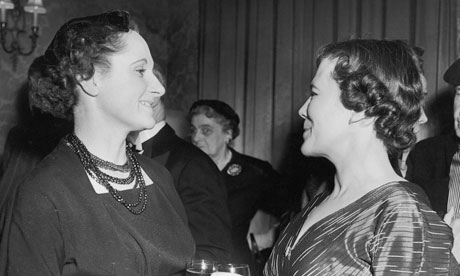
"No one bought her books, and only the middle aged or elderly had ever read them: she did not know she was now a legend of which the young had vaguely heard..."
So wrote Elizabeth Taylor (no, not that one, although the fact that you thought so is indicative of the problem) in 1957, about the eccentric hero of her novel Angel. But the words now seem all to relevant to her own case. Have you heard of the other Elizabeth Taylor? Have you read any of her books?
If you haven't, you aren't alone. She is, as Philip Hensher describes her, "one of the hidden treasures of the English novel" – or as this excellent article in the Atlantic puts it, "best known for not being better known". It was an exquisite cruelty of fate that in the very year that Elizabeth Taylor was starting to make a name for herself with the release of her first novel At Mrs Lippincote's, the film National Velvet blasted a certain other someone into the Hollywood stratosphere. The novelist, with her understated and apparently old-fashioned stories about servants and madams, housewives and marital complications, couldn't hope to compete. She was doomed to be the other Elizabeth Taylor, Elizabeth Taylor the writer, no, not that Elizabeth Taylor.
But if you're one of the few for whom her name does mean more than an unlucky coincidence, you're in exalted company. Kingsley Amis named her "one of the best English novelists born in this century"; Antonia Fraser called her "one of the most underrated writers of the 20th century". Hilary Mantel says that she is "deft, accomplished and somewhat underrated"; Rosamund Lehmann that she is "sophisticated, sensitive and brilliantly amusing, with a kind of stripped, piercing feminine wit". Jilly Cooper hails her as "a wonderful novelist." Both Paul Bailey and Elizabeth Jane Howard, meanwhile, declare that they "envy any reader coming to her for the first time".
I belong to that latter group. I can't claim any special knowledge; until a few weeks ago, I'd barely heard of Elizabeth-Taylor-the-writer either. My interest was piqued when Colm Toibin mentioned her on the New Yorker fiction podcast (even though he wasn't particularly flattering), and by chance a publicist from Virago got in touch a few days later to inform me that the 100th anniversary of Taylor's birth was on the way. I took the bait and read the aforementioned Angel. It is marvellous.
As my opening quote suggests, the book describes a novelist who finds great fame – and then finds herself losing it. "Lightening laced and veined the sky" is about the only sample of her novelist Angel's writing that Taylor gives us, but that quote, combined with the astonished mocking reactions of all who read her, tell us everything we need to know. Angel is jawdroppingly bad – and all the more popular because of it.
Her success and her absurdity provide plenty of opportunity for hilarious, cutting and almost cruel comedy. I say almost cruel, because aside from prose every bit as deft as Mantel suggests, the other distinguishing feature of this novel is its deep sympathy. Taylor makes us imagine the arrogant and strange Angel "sitting under the sea, casting spells, counting the corpses of the drowned", but she also makes us pity her. Early on in the story, for instance, the young Angel becomes annoyed with a man in a shop and shouts that he is an "ill bred jackanapes." It's a funny moment, but Taylor then builds it into something quite different:
"He looked startled, but when she turned to close the door she could see him through the glass panel. He was bowed over the counter as if weeping or in pain: for a moment she felt appeased, and then she saw that he was convulsed with laughter."
Ouch! And so it is throughout the book. The barbs cut both ways. Laughing at Angel becomes sad and painful. The comedy remains, but in the shadow of a deeper tragedy. It's one of the most moving books I've read for a long time, as well as one of the funniest. I have no doubt that this is a novelist whose name we should all remember.

